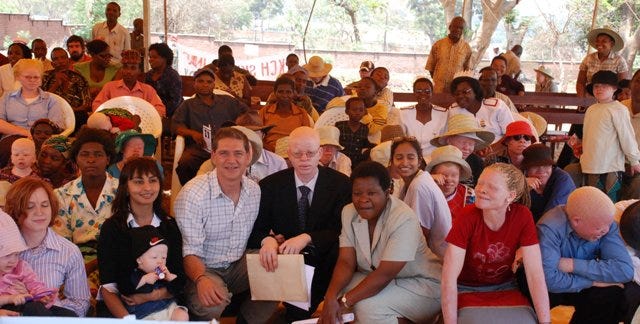APAM requests funds to support country's action plans for people with albinism
The Malawi Association of Persons with Albinism (APAM) has requested the government to provide funding to all stakeholders involved in the country's action plans for people with albinism.
MALAWI: The Malawi Association of Persons with Albinism (APAM) has requested the government to provide funding to all stakeholders involved in the country's action plans for people with albinism.
The association's president, Young Mhango, has questioned the fact that money is not given to people who have albinism in the country, a condition that has led the majority of the action plan's efforts to come to a halt.
His remarks come as the government has put aside 500 million kwacha in the budget for 2022/2023 to fund the implementation of action plans for the protection of people with albinism, as well as the creation of rehabilitation centers across the country.
Mhango applauded the administration for continuing to set aside funds for this reason in its budget.
He has, however, requested that the government ensure that the requirements relating to the assistance of people with albinism be met.
He said: "We were concerned that the government would cut funding, but the budget is similar to the fiscal year 2020–2021, therefore we are pleased."
Many of the projects and issues in the action plans, however, have come to a halt.
According to him, the government has a responsibility to ensure that monies are distributed to people with albinism through national action plans.
He has also urged the administration to guarantee that the monies will be saved for the appropriate purposes and distributed to persons with albinism as part of the country's action plans.
"The government should promise us that the funds earmarked to persons with albinism will be disbursed through national action plans," Mhango added. When questioned if the Tonse government is following through on its campaign pledges, Mhango said the process has been delayed so far.
He brought up the matter of the Tonse government's promise of a commission of investigation, which has yet to be implemented.
Furthermore, he voiced concern that this small population is still in danger and warned the public not to relax because albinism-related deaths have been reduced.
"It's a pity that the results of the commission of inquiry haven't been released yet. Because the killings have increased, we should not take this for granted.
"This is still a problem that we should all look into," Mhango added, "since people with albinism are still at risk."
Mhango stated that the results of the committee of inquiry might have been a breakthrough in the discovery of markets for their body parts, according to his organization.
"Perhaps the revelation of the conclusions of the panel of inquiry would have been a breakthrough in discovering the market for the body parts of people with albinism," he bemoaned.
During the 2020 election campaigns, the Tonse government promised to establish a commission of investigation into the terrible killings of persons with albinism in Malawi within the first 100 days of power.
However, the Tonse alliance has only been in power for nearly two years, and as a result, it has not been fulfilled.





